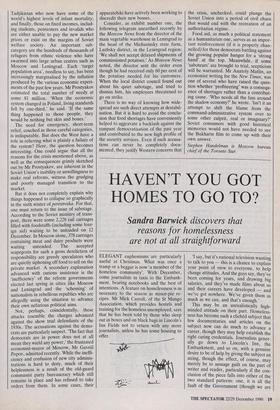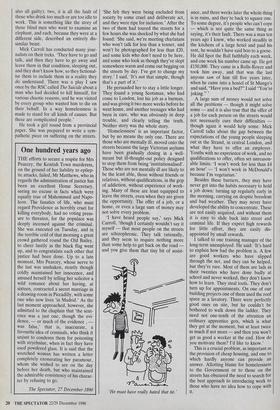HAVEN'T YOU GOT HOMES TO GO TO?
Sandra Barwick discovers that
reasons for homelessness are not at all straightforward
ELEGANT euphemisms are particularly useful at Christmas. What was once a tramp or a beggar is now 'a member of the homeless community'. With December, come journalists in taxis to the Embank- ment, bearing notebooks and the best of intentions. A feature on homelessness is as necessary to the season as mince-pie re- cipes. Mr Mick Carroll, of the St Mungo Association, which provides hostels and training for the homeless unemployed, says that he has been told by those who sleep out in boxes and on black bags in Lincoln's Inn Fields not to return with any more journalists, unless he has some housing to offer. `I say, but it's national television wanting to talk to you — this is a chance to explain your point of view to everyone, to help change attitudes. And the guys say, they've been coming for years, and drawing big salaries, and they've made films about us and their careers have developed — and we've got nowhere. We've given them as much as we can, and that's enough.' This may be an unrealistically high- minded attitude on their part. Homeless- ness has become such a cliched subject that few documentaries and articles on the subject now can do much to advance a career, though they may help establish the right caring credentials. Journalists gener- ally go down to Lincoln's Inn, the Embankment, and so on, with a genuine desire to be of help by giving the subject an airing, though the effect, of course, may merely be to assuage guilt on the part of writer and reader, particularly if the con- clusion of the piece falls into either of the two standard patterns: one, it is all the fault of the Government (though we are also all guilty); two, it is all the fault of those who drink too much or are too idle to work. This is something like the story of those blind men who went to examine an elephant, and each, because they were at a different side, described an entirely dis- similar beast.
Mick Carroll has conducted many jour- nalists on their treks. 'They have to go and talk, and then they have to go away and leave them in that condition, sleeping out, and they don't know how, so they fictional- ise them to include them in a reality they do understand. There was a play I saw once by the RSC called The Suicide about a man who had decided to kill himself, for various chaotic reasons, and he was visited by every group who wanted him to die on their behalf. In a way homelessness is made to stand for all kinds of causes. But these are complicated people.'
He took a girl round from a provincial paper. She was prepared to write a sym- pathetic piece on suffering on the streets. `She felt they were being excluded from society by some cruel and deliberate act, and they were ripe for inclusion.' After the two of them had toured the streets for a few hours she was shocked by what she had found: 'She said, we're meeting charlatans who won't talk for less than a tenner, and won't be photographed for less than £20, and some kids who don't need to be here, and some who look as though they've slept somewhere warm and come out begging on the streets by day. I've got to change my story.' I said, 'It's not that simple, though that's a part of it.'
He persuaded her to stay a little longer. They found a young Scotsman, who had come to London, lost his job as a barman, and was giving it two more weeks before he went home, and another teenager who had been in care, who was obviously in deep trouble, and clearly telling the truth. Neither story was the whole story.
`Homelessness' is an important factor, but by no means the only one. There are those who are mentally ill, moved onto the streets because the large Victorian asylums have been gradually closing in a well- meant but ill-thought-out policy designed to stop them from being 'institutionalised'. Those who are not mentally ill are likely to be the least able, those without friends or relatives, without qualifications, in the grip of addiction, without experience of work- ing. Many of these are least equipped to leave the streets, even when they are given the opportunity. The offer of a job, or a home, or even a large sum of money may not solve every problem.
`I have heard people say,' says Mick Carroll, 'though I certainly wouldn't say it myself — that most people on the streets are schizophrenic. They talk rationally, and they seem to require nothing more than some help to get back on the road and you give them that tiny bit of assist- 'He must have really hated that tie.' ante, and three weeks later the whole thing is in ruins, and they're back to square one. To some degree, it's people who can't cope — which is not quite the same thing as saying, it's their fault. There was a man ten years ago I knew, who worked steadily in the kitchens of a large hotel and paid his rent, he wouldn't have said boo to a goose. He did Spot the Ball faithfully each week, and one week his number came up. He got £150,000. They came in a Rolls-Royce and took him away, and that was the last anyone saw of him till five years later, when he came into a hostel of St Mungo's and said, "Have you a bed?" I said "You're joking." ' A large sum of money would not solve all the problems — though it might solve some — and it is also true that the offer of a job for each person on the streets would not necessarily cure their difficulties though again it would help some. Mick Carroll talks about the gap between the expectations of the young people sleeping out in the Strand, in central London, and what they have to offer an employer. Youths with no experience of work, and no qualifications to offer, often set unreason- able limits: 'I won't work for less than £4 an hour' — 'I won't work in McDonald's because I'm vegetarian.'
Besides these barriers, they may have never got into the habits necessary to hold a job down: turning up regularly early in the morning, carrying on despite boredom and bad weather. They may never have developed the ability to concentrate. These are not easily acquired, and without them it is easy to slide back into street and criminal life. If they expect high rewards for little effort, they are easily dis- appointed by small rewards.
I talked to one training manager of the long-term unemployed. He said: 'It's hard to explain how bad the problem is. A few are good workers who have slipped through the net, and they can be helped, but they're rare. Most of them are lads in their twenties who have done badly at school and never worked, they don't know how to learn. They steal tools. They don't turn up for appointments. On one of our building projects one of them used the roof space as a lavatory. There were perfectly good ones on site, but he couldn't be bothered to walk down the ladder. They need not one-tenth of the attention an ordinary apprentice gets, which is what they get at the moment, but at least twice as much if not more — and then you won't get as good a worker at the end. How do you motivate them? I'd like to know.' This is a crucial problem, as important as the provision of cheap housing, and one to which hardly anyone can provide an answer. Allotting blame for homelessness to the Government or to those on .the streets has obscured the need to search for the best approach to introducing work to those who have no idea how to cope with it.



































































































 Previous page
Previous page